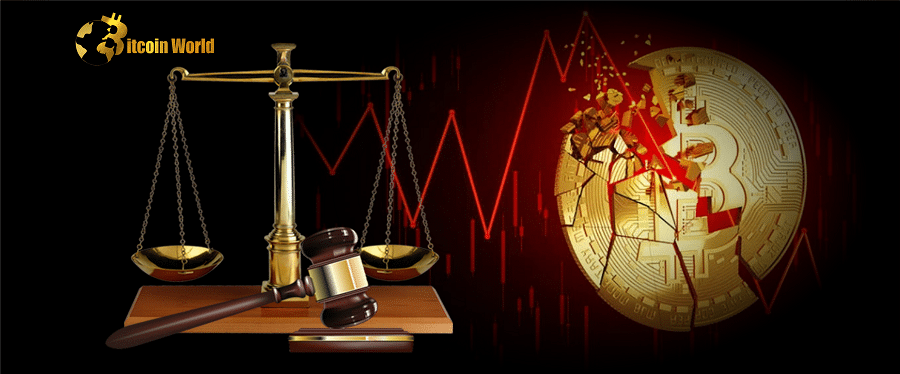The world of cryptocurrency remains under the microscope, and the latest development comes from Capitol Hill. The United States Senate Banking Committee is set to hold a crucial hearing focused on “crypto crashes,” signaling a continued deep dive into the volatile digital asset landscape. Scheduled for February 14th, this hearing is poised to be a significant event, especially in the wake of the tumultuous events of 2022, including the high-profile collapse of major exchanges like FTX.
Who Will Be Testifying?
The Senate Banking Committee has named three expert witnesses who will lend their insights to this important discussion. These individuals bring a wealth of knowledge from legal, economic, and regulatory perspectives:
- Yesha Yadav: A law professor at Vanderbilt University, Professor Yadav’s expertise in financial regulation and market structure will be invaluable in understanding the legal ramifications of crypto market events.
- Lee Reiners: As Policy Director of the Duke Financial Economics Center, Mr. Reiners brings a strong understanding of the economic impacts of cryptocurrency and the broader financial system. His perspective on policy implications will be keenly watched.
- Linda Jeng: A lecturer at Georgetown University Law Center’s Institute for International Economic Law, Ms. Jeng’s background is particularly noteworthy. She also holds the position of Chief Global Regulatory Officer and General Counsel at the Crypto Council for Innovation (CCI), a leading crypto advocacy group. It’s important to note that while Ms. Jeng is affiliated with CCI, she will be testifying in her capacity as a professor, offering an academic perspective on the issues at hand. Her previous roles at the Centre Consortium (founded by Circle and Coinbase) further solidify her deep understanding of the crypto industry and its regulatory challenges.
Why This Hearing Matters: Crypto Regulation in Focus
This hearing is particularly significant as it marks one of the first instances in the 118th Congress where cryptocurrency regulation will be directly addressed. The backdrop to this hearing is critical:
- 2022 Market Meltdown: The cryptocurrency market experienced a significant downturn in 2022, with numerous digital assets losing substantial value. This volatility has amplified calls for regulatory oversight to protect investors and maintain financial stability.
- FTX Bankruptcy: The collapse of FTX, once a leading cryptocurrency exchange, sent shockwaves through the industry. The exchange’s dramatic downfall exposed vulnerabilities within the crypto ecosystem and intensified scrutiny from regulators and lawmakers alike.
This hearing isn’t happening in a vacuum. It follows previous discussions and inquiries into the crypto space. Just two months prior, in December, US senators convened to discuss the FTX debacle and explore potential legislative responses. That earlier hearing featured a diverse panel of voices, including:
- Ben McKenzie: The Hollywood actor and vocal crypto critic offered a skeptical perspective on the industry.
- Hilary Allen: A law professor, likely providing legal and regulatory insights, similar to Professor Yadav in the upcoming hearing.
- Kevin O’Leary: The “Shark Tank” star and businessman brought a more investment-focused viewpoint to the discussion.
- Jennifer Schulp: From the Cato Institute, Ms. Schulp likely provided a perspective aligned with free-market principles and limited government intervention.
Notably, former FTX CEO Sam Bankman-Fried was initially expected to testify before the House Financial Services Committee in December. However, his arrest in the Bahamas prevented his appearance. Instead, the current CEO of FTX, John Ray, testified later in an FTX bankruptcy hearing on February 6th, offering a glimpse into the inner workings and financial state of the collapsed exchange.
What to Expect from the Hearing?
While the specific agenda and questions for the witnesses haven’t been publicly detailed, we can anticipate that the hearing will likely delve into several key areas:
- Understanding the “Crypto Crashes”: The committee will aim to understand the underlying causes of recent market downturns and the specific factors that contributed to the failures of companies like FTX.
- Investor Protection: A major concern is the protection of consumers and investors in the often-complex and rapidly evolving crypto market. Expect questions around current investor safeguards and potential improvements.
- Regulatory Gaps: Lawmakers will likely explore existing regulatory frameworks to identify gaps and weaknesses that allowed for events like the FTX collapse to occur.
- Future Regulation: The hearing could serve as a platform to discuss potential legislative remedies and new regulations aimed at creating a more stable and secure crypto ecosystem. This could involve discussions around which agencies should have primary oversight and what specific rules are needed.
- The Role of Advocacy Groups: With Linda Jeng’s participation, albeit as a professor, the role and influence of crypto advocacy groups like CCI may also come under scrutiny. Her dual perspective could provide valuable insights into the industry’s self-regulation efforts and its engagement with policymakers.
Looking Ahead: A Critical Juncture for Crypto
The upcoming Senate Banking Committee hearing represents a critical moment for the cryptocurrency industry in the United States. As lawmakers grapple with the lessons learned from recent market turmoil, the testimonies of these expert witnesses will be crucial in shaping the future regulatory landscape. The discussions and potential legislative actions that stem from this hearing could have a profound impact on how cryptocurrencies operate, innovate, and are perceived within the US financial system. For anyone involved in or observing the crypto space, February 14th is a date to watch closely.
Cointelegraph reached out to the Crypto Council for Innovation and Linda Jeng for comment but had not received a response at the time of reporting.
Disclaimer: The information provided is not trading advice, Bitcoinworld.co.in holds no liability for any investments made based on the information provided on this page. We strongly recommend independent research and/or consultation with a qualified professional before making any investment decisions.


